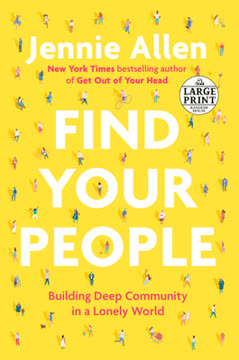Key Takeaways
1. Moses' Life: A Blueprint for Resilience and Personal Growth
"There is no such thing as a life without struggle . . . . There is no one who does not have to choose sometime, some way between giving up and growing stronger."
Lessons from Moses: The story of Moses provides invaluable insights into human resilience and personal growth. His journey from prince to prophet, filled with triumphs and setbacks, offers a powerful template for navigating life's challenges.
Key aspects of Moses' resilience:
- Ability to adapt to changing circumstances (from palace to wilderness)
- Persistence in the face of repeated failures and disappointments
- Willingness to confront personal limitations and grow
- Capacity to maintain faith and purpose despite setbacks
Moses' life demonstrates that true strength comes not from avoiding struggles, but from facing them head-on and using them as opportunities for growth and self-discovery.
2. The Power of Dreams and the Courage to Dream Again
"We must be willing to get rid of the life we planned so as to have the life that is waiting for us."
Embracing new dreams: Life often demands that we let go of our initial dreams and embrace new ones. This process, while painful, is essential for personal growth and fulfillment.
The journey of dreams:
- Initial dreams: Often idealistic and shaped by youthful aspirations
- Broken dreams: Inevitable disappointments and setbacks
- New dreams: Shaped by experience, more realistic and attainable
The key is not to cling desperately to broken dreams, but to honor them while being open to new possibilities. This flexibility allows us to adapt to life's changes and find fulfillment in unexpected places.
3. Embracing Humility: Understanding It's Not All About You
"Humility is the realization that not everything that happens in life is all about you."
True humility: Often misunderstood, humility is not about self-deprecation or false modesty. It's about recognizing our place in the larger scheme of things and understanding that we are not the center of the universe.
Benefits of humility:
- Reduces stress and anxiety by alleviating the pressure to control everything
- Enhances relationships by allowing us to truly listen and empathize with others
- Promotes personal growth by making us open to learning and feedback
- Increases resilience by helping us put setbacks into perspective
Humility allows us to navigate life's ups and downs with grace, knowing that our worth is not determined solely by our successes or failures.
4. Balancing Work, Family, and Personal Fulfillment
"The richest lives attain an inner balance comprised of work, play and love in equal order. To pursue one at the expense of the others is to open oneself to sadness in older age."
Holistic approach to life: A fulfilling life requires balance across multiple dimensions. Even great figures like Moses struggled with this balance, often at the cost of family relationships.
Key components of a balanced life:
- Work: Meaningful engagement and contribution
- Family: Deep, nurturing relationships
- Personal growth: Continuous learning and self-improvement
- Community involvement: Contributing to something larger than oneself
- Leisure: Time for rest, reflection, and enjoyment
Striving for this balance is an ongoing process, requiring regular reflection and adjustment. It's about making conscious choices about how we allocate our time and energy.
5. The Importance of Keeping Promises and Maintaining Integrity
"Keeping one's promise is more than just maintaining your own integrity. It is more than doing what you said you would do. It is a sign that you recognize the image of God in another person by taking your obligation to that person as seriously as you take your own well-being."
Promise-keeping as a foundation: Keeping promises is fundamental to personal integrity and the fabric of society. It's about honoring our commitments and recognizing the value of others.
Impact of promise-keeping:
- Builds trust in relationships
- Strengthens personal character
- Creates a stable and predictable social environment
- Demonstrates respect for others and oneself
In a world where commitments are often treated lightly, consistently keeping promises sets one apart and builds a reputation for reliability and integrity.
6. Learning from Disappointment and Failure
"There are no second acts in American lives."
Growth through adversity: Contrary to F. Scott Fitzgerald's famous quote, life often offers second chances. The key is learning how to use disappointments and failures as stepping stones to growth and new opportunities.
Strategies for turning failure into growth:
- Reflect on the experience to extract lessons
- Reframe failure as a learning opportunity rather than a final judgment
- Use setbacks to reassess and refine goals
- Develop resilience by persisting through difficulties
- Seek support and perspective from others
Failure and disappointment, when approached with the right mindset, can be powerful catalysts for personal and professional growth.
7. Cultivating Compassion and Empathy Through Shared Experiences
"What connects us to others and to the world [is what] breaks our hearts."
Power of shared experiences: Our personal struggles and heartbreaks, rather than isolating us, can be powerful tools for connecting with others and developing deeper empathy and compassion.
Ways to cultivate compassion:
- Use personal experiences of pain to understand others' suffering
- Participate in support groups or community service
- Practice active listening and empathy in daily interactions
- Reflect on how your challenges have shaped your perspective
- Share your own story to help others feel less alone
By recognizing our shared humanity in times of struggle, we can transform personal pain into a force for connection and positive change in the world.
8. The Art of Letting Go and Redefining Success
"It is no longer essential to succeed, no longer catastrophic to fail."
Redefining success: True maturity involves freeing ourselves from rigid definitions of success and failure. It's about finding value and meaning beyond external achievements.
Steps to redefine success:
- Identify personal values beyond societal expectations
- Set goals that align with these values
- Celebrate small victories and personal growth
- Learn to appreciate the journey, not just the destination
- Develop a growth mindset that values learning over perfection
By letting go of narrow definitions of success, we open ourselves to a richer, more fulfilling life experience that values personal growth and meaningful relationships over external validation.
9. Finding Purpose Beyond Personal Achievement
"We need to feel that we are contributing to our world, paying the tax on the space we occupy and the air we breathe by doing something to make our world a better place."
Purpose through contribution: True fulfillment often comes not from personal achievements, but from contributing to something larger than ourselves.
Ways to find purpose through contribution:
- Engage in community service or volunteer work
- Mentor others in your field of expertise
- Support causes aligned with your values
- Create art or work that inspires or helps others
- Foster meaningful relationships and support networks
By shifting focus from personal gain to collective well-being, we can find a deeper sense of purpose and satisfaction in life. This approach not only enriches our own lives but also positively impacts the world around us.
Last updated:
FAQ
1. What is Overcoming Life’s Disappointments by Harold S. Kushner about?
- Exploring Disappointment Through Moses: The book uses the biblical figure of Moses as a lens to examine how people can cope with and overcome life’s inevitable disappointments.
- Lessons for Modern Readers: Kushner draws parallels between Moses’ struggles and the challenges faced by ordinary people, offering practical wisdom for dealing with unfulfilled dreams, setbacks, and loss.
- Focus on Resilience and Growth: The central message is about developing resilience, finding meaning, and growing through adversity rather than being defined by failure.
- Blending Faith and Psychology: The book combines Jewish teachings, psychological insights, and real-life stories to provide a holistic approach to handling disappointment.
2. Why should I read Overcoming Life’s Disappointments by Harold S. Kushner?
- Universal Relevance: Everyone faces disappointment; the book offers guidance that applies to a wide range of personal and professional setbacks.
- Accessible Wisdom: Kushner’s writing is compassionate and accessible, making complex spiritual and psychological concepts easy to understand and apply.
- Practical Strategies: The book provides actionable advice for moving forward after loss, failure, or rejection, rather than remaining stuck in bitterness or regret.
- Inspirational Examples: By examining Moses’ life and other real-world stories, readers gain inspiration and reassurance that disappointment can lead to growth and new possibilities.
3. What are the key takeaways from Overcoming Life’s Disappointments by Harold S. Kushner?
- Resilience Over Perfection: True success is not about achieving every dream, but about responding to disappointment with resilience, wisdom, and faith.
- Cherishing Broken Dreams: Kushner encourages readers to honor the “broken pieces” of their dreams, using them as stepping-stones for future growth rather than millstones of regret.
- Redefining Success: The book suggests that fulfillment comes from becoming the person you are meant to be, not necessarily the person you once dreamed of being.
- The Power of Community and Compassion: Support from others and the ability to forgive—both oneself and others—are essential for healing and moving forward.
4. How does Harold S. Kushner use the story of Moses in Overcoming Life’s Disappointments?
- Moses as a Model: Moses is portrayed not just as a triumphant leader, but as someone who faced repeated setbacks, frustrations, and unfulfilled dreams.
- Learning from Failure: Kushner highlights how Moses responded to disappointment—such as being denied entry to the Promised Land—by maintaining faith and continuing to lead.
- Humanizing a Hero: The book emphasizes Moses’ humanity, including his doubts, anger, and family struggles, making his story relatable to modern readers.
- Symbolism of Broken Tablets: Moses’ act of carrying both the whole and broken tablets of the Ten Commandments becomes a metaphor for carrying both dreams and disappointments through life.
5. What practical advice does Overcoming Life’s Disappointments by Harold S. Kushner offer for dealing with setbacks?
- Acknowledge and Grieve: Kushner advises recognizing and mourning lost dreams, rather than denying or minimizing disappointment.
- Find New Dreams: He encourages readers to let go of unattainable goals and to seek new, more realistic dreams that fit their current circumstances.
- Focus on Integrity and Purpose: The book stresses the importance of keeping promises, acting with integrity, and remembering who you are “working for”—your values, not just external rewards.
- Practice Forgiveness and Compassion: Letting go of bitterness and forgiving both oneself and others is essential for healing and moving forward.
6. What does Harold S. Kushner mean by “the tyranny of the dream” in Overcoming Life’s Disappointments?
- Unrealistic Expectations: “The tyranny of the dream” refers to the idea that clinging to youthful or unrealistic dreams can lead to chronic dissatisfaction and a sense of failure.
- Freedom Through Letting Go: Kushner suggests that maturity involves freeing oneself from these unattainable dreams and embracing new, more authentic aspirations.
- Sacrifice as Growth: Giving up an old dream is framed as a meaningful sacrifice that can lead to personal growth and a deeper sense of purpose.
- Honoring the Past, Embracing the Future: The book encourages cherishing the memory of old dreams while being open to new possibilities.
7. How does Overcoming Life’s Disappointments by Harold S. Kushner address the role of humility?
- Humility Redefined: Kushner defines humility not as self-effacement, but as the recognition that not everything is about you and that many things are beyond your control.
- Relief from Burden: Accepting that you are not responsible for everything can be liberating and reduce unnecessary guilt or self-blame.
- Connection to Others: Humility fosters compassion, as personal suffering is seen as a point of connection rather than isolation.
- Balance of Responsibility: The book teaches that while you should take responsibility for your actions, you must also accept the limits of your power.
8. What does Overcoming Life’s Disappointments by Harold S. Kushner say about keeping promises and integrity?
- Promises as Foundation: Keeping promises is presented as a cornerstone of personal integrity and the glue that holds relationships and society together.
- Temptation to Break Promises: The book explores the tension between personal gain and the commitment to keep one’s word, using stories from both scripture and modern life.
- Consequences of Betrayal: Breaking promises leads to a loss of trust, both from others and within oneself, and can have far-reaching negative effects.
- Faithfulness as Strength: Kushner argues that true strength lies in honoring commitments, even when it is difficult or inconvenient.
9. How does Overcoming Life’s Disappointments by Harold S. Kushner address the process of forgiveness and moving on?
- Forgiveness as Release: Forgiveness is described as letting go of the hope for a better past and freeing oneself from the burden of resentment.
- Not Exoneration, But Healing: Forgiving does not mean excusing harmful behavior, but rather choosing not to let past hurts define your present and future.
- Importance for Aging Well: The ability to forgive is linked to contentment and happiness in later life, as holding onto bitterness leads to isolation and unhappiness.
- Forgiving Oneself: The book also emphasizes the importance of self-forgiveness for mistakes and unfulfilled dreams.
10. What are the main concepts and metaphors in Overcoming Life’s Disappointments by Harold S. Kushner?
- Broken Tablets as Metaphor: The image of Moses carrying both the whole and broken tablets symbolizes carrying both dreams and disappointments as part of a full life.
- Sacrifice and Letting Go: Sacrifice is redefined as giving up cherished but unattainable dreams to make room for new growth.
- Hard Road, Not a Smooth One: Life’s challenges are likened to a hard road that builds strength and character, rather than a smooth, unchallenging path.
- Humility and Perspective: Humility is a recurring theme, teaching that not everything is within our control and that suffering can connect us to others.
11. What are the best quotes from Overcoming Life’s Disappointments by Harold S. Kushner and what do they mean?
- “The whole and the broken live side by side in us all.” – This quote encapsulates the idea that both fulfilled and unfulfilled dreams are part of a complete life.
- “We must be willing to get rid of the life we planned so as to have the life that is waiting for us.” – Quoting Joseph Campbell, Kushner emphasizes the importance of letting go of rigid expectations to embrace new possibilities.
- “Forgiveness means giving up all hope of having had a better past.” – This line highlights the liberating power of accepting what cannot be changed and moving forward.
- “A full and complete blessing means the experience of life in its fullness, tasting everything that life has to offer, the bitter and the sweet.” – Kushner redefines blessing as embracing the entirety of life, not just its joys.
12. How can readers apply the lessons from Overcoming Life’s Disappointments by Harold S. Kushner to their own lives?
- Embrace Resilience: Accept setbacks as part of life and focus on how you respond, rather than on what you have lost.
- Honor Your Journey: Cherish both your successes and your disappointments as integral to your personal growth and identity.
- Seek New Meaning: When old dreams are no longer possible, look for new sources of purpose and fulfillment.
- Practice Compassion and Forgiveness: Extend understanding to yourself and others, letting go of bitterness to make room for healing and connection.
Review Summary
Overcoming Life's Disappointments receives mostly positive reviews, with readers praising its compassionate and wise approach to dealing with life's setbacks. Many find comfort and inspiration in Kushner's use of Moses as an example of resilience. The book offers strategies for processing disappointment, emphasizing the importance of humility, forgiveness, and maintaining a positive attitude. Some readers appreciate the religious aspects, while others find them less relatable. Overall, reviewers commend the book for its insightful perspective on navigating life's challenges and finding meaning in difficult times.
Similar Books










Download PDF
Download EPUB
.epub digital book format is ideal for reading ebooks on phones, tablets, and e-readers.








